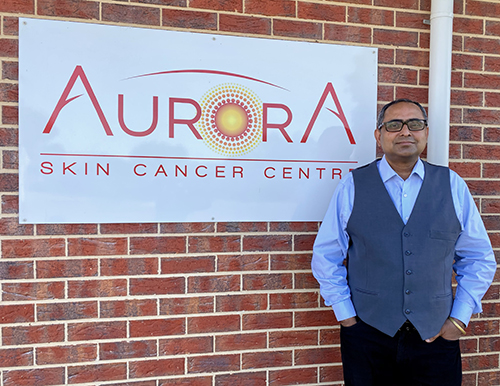WHEN caught and treated early, skin cancers are highly curable and in the early stages of skin cancer development, you’re the one with the best chance to see changes.
That’s why we recommend that you ex- amine your skin head-to-toe every month – it’s a simple but powerful way to look at yourself with a new focus that can save your life.
The sooner skin cancer is found, the easier it is to treat.
Getting to know your skin and what’s normal for you is best to ensure skin cancer is found early.
Most skin cancers are found by people checking their skin or are noticed by a loved one.
Skin cancer can present in many different ways, which is why it’s essential to know your skin and what’s normal for you.
If you see something new, changing or unusual, get checked by your GP or a skin cancer doctor right away – it could be skin cancer.
What should you look for in a skin check?
- A growth that increases in size and appears pearly, transparent, tan, brown, black, or multi-coloured;
- A mole, birthmark or brown spot that increases in size, thickness, changes col- our or texture or is bigger than a pencil eraser – learn the ABCDEs of melanoma;
- A spot or sore that continues to itch, hurt, crust, scab, or bleed; and/or
- An open sore that does not heal with- in three weeks;
Any spot that strikes you as being a bit odd; take it seriously – it’s worth getting it checked by a doctor.
People at higher risk of skin cancer are those who have:
- A personal or family history of skin cancer;
- A large number of moles;
- A compromised immune system or are on immunosuppression medication;
- A fair skin type and skin colour;
- A history of bad sunburns;
- Spent lots of time outdoors unprotected or worked outdoors; and
- Suntanned, use or have used solariums or sunlamps.
Skin cancer can usually be successfully treated if found early but without treatment, skin cancer can be deadly.
If you meet any risk criteria, see your doctor to develop a surveillance plan and check your skin regularly for any changes.
Some people (such as transplant recipient patients, people with compromised immune systems and genetic skin cancer risk) are at high risk of skin cancer and may require additional sun protection and early detection strategies specific to their health needs.
Please consult your doctor for specific health advice.


